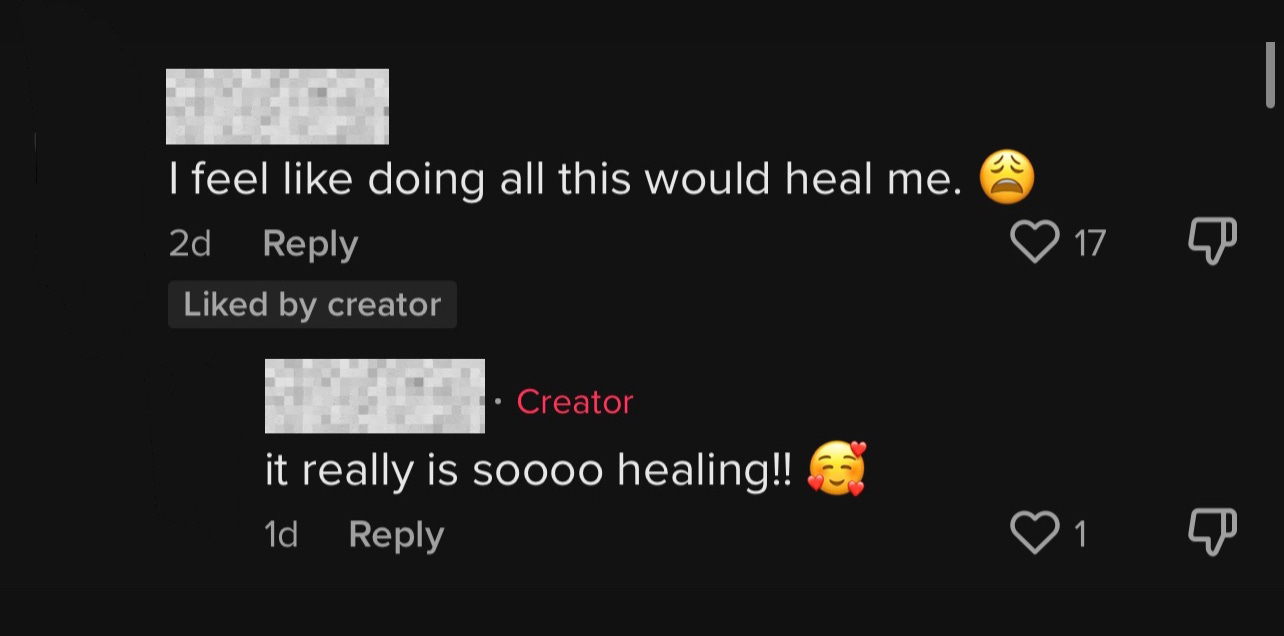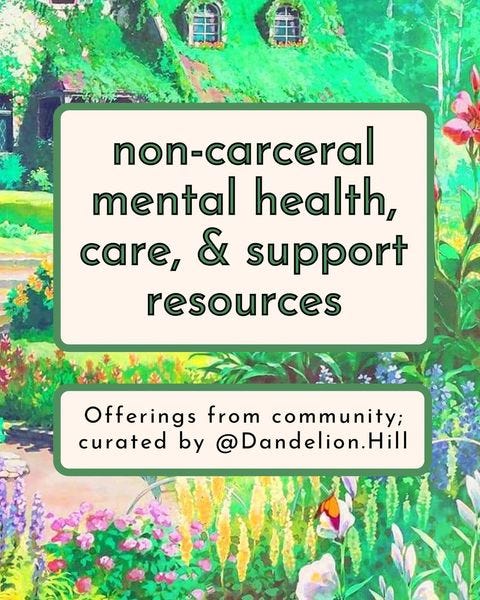Hi, sweet beans. Thanks for reading Healing Field Notes, a newsletter I send out twice a month. This newsletter will always be a free offering. However, consider a paid subscription if you’d like to support my writing.
CW: Disordered eating, ableism, fatphobia
I am an ex-member of the Cult of the Wellness Industry™. Between 2016-2019, you could find me swearing by essential oils for all ailments, eating up fear-mongering tactics around all “toxic” chemicals found in everyday products, trying to recover from my undiagnosed OCD by healing my gut1, and telling my employer, where I worked with a highly immunocompromised population, that I wasn’t going to get the flu vaccine because an influencer who did daily coffee enemas told me it was bad for me. That’s right, I just barely escaped the Wellness to Anti-Vax pipeline.
The other day, I was scrolling through TikTok and came across a “slow morning” video. The creator began her day by oil pulling paired with a montage of her morning while a voice-over explains how she does everything she can to distract herself from the discomfort of oil pulling. She squeezes a lemon into her water, proceeds to get lemon juice in her eye, and says it’s a nice distraction. I have been here. I have chugged down lemon juice and chlorophyll for breakfast because I was told I needed to detox (something that, surprise, your liver does for you2). I continue watching and think, “If you are participating in a routine that requires you to step outside your body and distract yourself from what you’re experiencing, that isn’t wellness.” Something I’m glad I think now, but didn’t always.
She goes on to take all her supplements, and I find my jaw agape at how many things were in this routine, let alone how much it must have cost. So, I calculated all the supplements in her video to see how much her regimen would be if she purchased every item at once without any discount codes.
Water minerals: $54
Acupuncture mat: $78
Red light therapy mask: $465 (what the HELL)
Face serum: $60
Moisturizer: $255
Vitamin C supplement: $62
Sea moss gel: $36
This “slow morning” routine costs $1,010.
She is trying to influence watchers into believing that these regimens would be the thing that heals us, that brings us to wellness. Upon research, I find this creator has discount codes for five out of the seven products – meaning she gets a cut for every item she convinces us we need. The belief that the consumer needs something else to feel better puts money into her and the company's pockets. It’s no wonder it’s a 4 trillion dollar industry3. I resist.
Many influencers are beginning to pull the curtain back and talk about the performative nature of social media and influencing as a profession, also known as de-influencing. Many are critiquing its promotion of overconsumption, not just for the consumer but also for the influencer.
As someone who did some “influencing” in 2021-2022 and mostly stepped away from it at the end of 2022 (plus or minus a few partnerships I still take on if they align with my values), I can attest to the overconsumption. I know the feeling of wanting to find “authentic” ways to work gifted products into your everyday content (hot tip: most “gifted” items usually don’t authentically fit into anyone’s life because they aren’t supposed to. Brands aren’t thinking about longevity. They are thinking about money.). I took the month of October off to reckon with my relationship with the gig. Now, I walk the fine line between influencer and consumer.
You cannot buy your way into wellness4.
In a world that wants us to hack wellness to be the most “productive” “girl boss” version of ourselves, it’s easy to fall into the traps of the wellness industry. We’re told that buying this brand’s product will be *the* game changer for our routine. It’ll help us sleep, relax, be less stressed, experience less discomfort, less bloating, or some other promise likely rooted in ableism or fatphobia that cannot actually be promised at all. The wellness industry is insidious because it doesn’t just stop at supplements. It makes us believe our mornings are incomplete. This kind of rhetoric seeps into what and how we eat, causing disordered eating, and goes so far as to seep into how we connect with one another. It doesn’t account for collective trauma, oppressive systems, and is hyper-individualistic.
Yes, I once fully opted into it all and thought everything would be cured if I added one more supplement, restriction, or oil to my regime. I feared anything with any “chemicals” in it and would try to get anyone and everyone on board with me. At the peak of my undiagnosed autoimmune disease, I looked to anything to help me feel better and paid hundreds of dollars for things that ultimately didn’t work or made me feel worse.
When I scrolled past this creator’s video, I couldn’t help but scream: IT IS TIME TO DE-INFLUENCE WELLNESS because I have been that commenter above. I know what it’s like to feel at your wit’s end with existence and are willing to do almost anything to feel better. To feel healed. To do or buy anything to make it come to fruition.
I felt the same when I was unmedicated and was told I could non-dairy my way out of my mental illness. It doesn’t help that I would see people5 say, “depression is a message and opportunity to change. And the primary pillar of this change is nutrition.” What up, diet culture? What up, the demonization of medication that actually ended up being the thing that saved my life?
In a world where viewing violence is a tap away at any moment in little rectangular light boxes, it makes sense we would want to do anything to feel at least marginally better, especially if you have any marginalized identity. I have bigger dreams for wellness.
Next time you find yourself scrolling past a video of a “slow morning,” ask yourself: how much does this morning cost? Is this morning accessible? Is this routine rooted in something oppressive such as fatphobia? Is this promoting an eating disorder?
Is this morning grounded? Is this morning restrictive? Is this morning present? Is this pleasurable? Does this morning take you out of your body? Does this morning help connect us deeper with ourselves? Connect with one another?
You might think, “Sam, you sure are talking a lot of shit. What does your morning look like?” You’re right, I am talking a lot of shit because I’ve been on both sides. And I plan to tell you how I escaped and how I think now. But you’ll have to stick around for part 2.
Here are some podcast episodes and books that wellness topics more in-depth:
Maintenance Phase: Goop
Sounds like a Cult: The Cult of Goop
The Gospel of Wellness: Gyms, Gurus, Goop, and the False Promise of Self-Care
You can find this month’s episode here! I’m very excited because I have a special guest for February’s edition of the pod. If you’d like to ask a question anonymously for an upcoming episode, you can fill out this Google Form.
If you have made it this far, THANK YOU. I’m so glad you are here. If you have enjoyed this newsletter and want to support me you can:
Share a snippet on social media & tell someone to subscribe
Forward this email to a friend you think would enjoy it
Venmo me a one-time donation at @samslupski (15% of donations will be redistributed to mutual aid funds and/or local grassroots organizations)
Hire me to write for you
Thanks for sticking around.
Love,
This is not to say that healing your gut microbiome isn’t tied to mental health or overall well-being.
https://www.washingtonpost.com/wellness/2022/01/11/are-detox-juice-cleanses-necessary/
https://www.visionresearchreports.com/health-and-wellness-market/38526
Yes, we can buy products and services that help us access things that make us feel well, such as mental health care, medical services, healthcare, and medications. In this context, I am talking about wellness products that marketed to us through brands and major companies like Goop
https://jezebel.com/anti-medication-goop-summit-expert-claims-aids-treatmen-1820919802














I am someone who has been deeply impacted by healthism and wellness culture impingements for years. How can we not be? The perfect/healthy/pure/well body has extended to my career in a number of ways, toxic professionalism being one of them. As a psychotherapist this has really taken a toll on the sustainability of my work. Recently my colleague and I wrote this piece speaking to the intersection of wellness culture dictates and care worker burnout. We Need Not Be Fine: A Manifesto for Mental health Care Workers Who Can't Go On Like This can be read here: https://medium.com/@kintsugitherapistcollective/we-need-not-be-fine-a-manifesto-for-mental-healthcare-workers-who-cant-go-on-like-this-2e939140c928
Such a good read!!